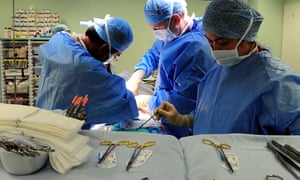Saturday 1 April marks the fourth anniversary of NHS’s medical director Bruce Keogh’s scathing report on the regulation of cosmetic procedures. It concluded that dermal fillers are a crisis waiting to happen – and said they should be classified as a prescription-only medical device.
Yet today little has changed. As an NHS reconstructive surgeon, I am frequently called on to fix the mistakes of unqualified beauty consultants.
Understanding the intricacies of facial anatomy and physiology has taken me half a lifetime of rigorous medical training to master. Yet flimsy regulation means an individual can jump on to YouTube, watch a couple of “how-to” clips, order supplies online and set up as a bona fide consultant.
The dangers are clear. I have seen around 50 women in the past few years, some with allergies to filler, others with filler pouring out of their faces – many in need of multiple, complex procedures to restore their features. And it is clear numbers are increasing.
Health minister Philip Dunne recently said that the majority of these products were intended to be used in reconstructive surgery, and regulated medical professionals are bound by professional standards and terms of registration. But what of the budding hairdresser turned beauty consultant? Who is there to regulate these rogue practitioners?
The non-surgical cosmetic procedures market is worth £3.6bn. And non-surgical procedures account for 90% of all cosmetic interventions. Individual filler sessions can cost £300. Such clear financial incentives are unlikely to dissuade the let’s-give-it-a-go brigade. Regulation is key. The General Medical Council has compiled a guide for physicians to establish standards. But binding regulation is needed. Other non-medical organisations such as Save Face have also tried to direct the public to practitioners with appropriate training.
As a plastic surgeon who works in the NHS, I have a team of colleagues who reconstruct the faces of children and adults with facial deformities.
Sadly, a new group of patients are emerging whose features have been changed, sometimes irreversibly, by non-surgical cosmetic procedures. It is essential that anyone receiving these treatments has confidence in their practitioner, and we must encourage patients not to be lured by quick fixes and unbelievable deals.
Simon Eccles
Member, British Association of Plastic, Reconstructive and Aesthetic Surgeons
Source: https://www.theguardian.com/lifeandstyle/2017/mar/31/there-is-no-quick-fix-in-cosmetic-surgery


